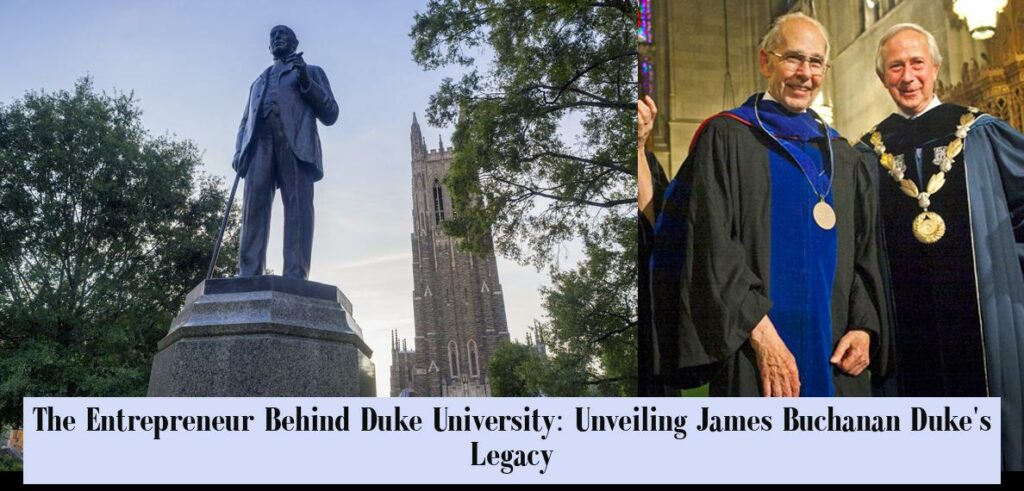Who is James Buchanan Duke?
Ah, James Buchanan Duke – the mastermind behind the prestigious Duke University! Picture this: a man with a knack for tobacco and a flair for hydroelectric generation, building not just one but two massive fortunes. But wait, there’s more to this tale.
Let’s dive into the nitty-gritty details. James Buchanan Duke, a titan in the realms of tobacco and electricity, laid the foundation for Duke University in 1924. The university stands tall as a memorial to his father, Washington Duke, part of a family that etched its name in history with global tobacco production and regional electricity advancements.
Did you know that before its transformation into Duke University by James Buchanan Duke, the institution was known as Trinity College? It was initially founded by Methodists and Quakers way back in 1838 in present-day Trinity before making its way to Durham in 1892.
Now, let’s address the burning question – why is Duke University so renowned? Well, it’s all about their unwavering dedication to academic excellence, cutting-edge medical research, stellar athletic triumphs, and deep-seated community involvement. It’s no wonder Duke University shines like a diamond in the academic realm!
So next time you step foot on campus or hear about Duke University’s success stories, remember that it all traces back to the visionary mind of James Buchanan Duke. Exciting stuff ahead! Keep reading to uncover more fascinating details about this iconic institution.
| Founder | James Buchanan Duke |
|---|---|
| Founded | 1924 |
| Reason for Establishment | Memorial to his father, Washington Duke |
| Source of Wealth | Tobacco and hydroelectric generation |
| Distinguished Reputation | Academic excellence, medical research, athletic achievements, community engagement |
The History and Founding of Duke University
The history of Duke University traces back to 1838 when it first opened as Brown’s Schoolhouse in Randolph County, North Carolina. Over the years, it underwent several name changes, evolving from Union Institute Academy to Normal College and eventually becoming Trinity College in 1859. The pivotal move to Durham in 1892 marked a significant growth phase for the institution, catalyzed by the generosity of influential figures like Julian S. Carr and Washington Duke.
The contributions of these Methodists who made their fortunes through the tobacco and electrical industries played a vital role in shaping Duke University’s foundation. Washington Duke’s visionary decision to endow the college with substantial funds propelled its transformation into Duke University in 1924, honoring his father’s legacy.
With an initial endowment from Washington Duke and subsequent contributions that paved the way for equality in education by admitting women on an equal footing with men early on, Duke University embarked on a journey towards global recognition. By appointing William Preston Few as president in 1910, Trinity College set its sights on emulating prestigious institutions like Yale and Harvard, solidifying its position as a premier academic powerhouse.
The Legacy of the Duke Family
In the Legacy of the Duke Family, James B. Duke’s enduring commitment to social progress and economic development shines through various entities linked to his name. The establishment of Duke University in 1924, through the Duke Endowment’s Indenture of Trust, marked a pivotal moment in honoring his legacy. Trinity College transformed into Duke University as a tribute to Washington Duke and family history, underlining their philanthropic roots deeply embedded in Methodist principles.
The story goes back to Washington Duke instilling values of responsibility and perseverance in his children, setting the stage for James B. Duke’s remarkable contributions later on. Despite facing early hardships like losing his mother and half-brother to typhoid fever at a tender age of two, James B. Duke’s resilience and family teachings paved the way for his illustrious legacy.
The path taken by the Dukes reflects not only a dedication to financial stewardship but also a commitment to uplifting those in need. Their ties with Methodism and Republican ideals shaped their philanthropic endeavors, culminating in monumental contributions that led to transformative initiatives such as the creation of educational institutions like Duke University.
It’s fascinating how familial influence intertwines with historical events like Washington Duke assisting Trinity College’s relocation or Ben being actively involved with its Board of Trustees from as early as 1887. These connections underscore a rich legacy entrenched in education, community welfare, and progressive values—a legacy that continues to inspire generations.
Do you find these intertwined stories of family values and historic milestones intriguing? How do you think early life experiences can shape individuals’ future endeavors and legacies? Share your thoughts!
- James Buchanan Duke is the founder of Duke University.
- Duke University was founded in 1924 as a memorial to his father, Washington Duke.
- Before becoming Duke University, the institution was known as Trinity College.
- Duke University is renowned for academic excellence, medical research, athletic achievements, and community engagement.
- James Buchanan Duke amassed his wealth through tobacco and hydroelectric generation.
- The history of Duke University dates back to 1838 and has undergone several name changes before settling on its current name.
Who is the founder of Duke University?
James Buchanan Duke is the founder of Duke University, established in 1924.
How did Duke University get its name?
Duke University got its name in 1924 when James Buchanan Duke established The Duke Endowment in honor of his father, Washington Duke.
How did James Buchanan Duke make his money?
James Buchanan Duke made his money by building two massive fortunes, the first in tobacco and the second in hydroelectric generation.
Why is Duke University famous?
Duke University is famous for its commitment to academic excellence, state-of-the-art medical research, athletic achievements, and community engagement.

